Episode 1 with introduction: https://networkcultures.org/blog/2020/04/09/selfies-under-quarantine/
Episode 2: https://networkcultures.org/blog/2020/04/16/selfies-under-quarantine-episode-2/
Episode 3: LOVE AND SEX IN TIMES OF COVID-19
In collaboration with Danielle, Shaina, Briana, Jackie, Marta, Gabriella, Sydney, Elena, Sophia and Natalia
This week’s readings:
Excerpts from Eva Illouz’s Cold Intimacies. The Making of Emotional Capitalism and excerpts from Melissa Broder’s So Sad Today
Day 44 since the lockdown started in Italy.
My Facebook wall is populated by these little ads
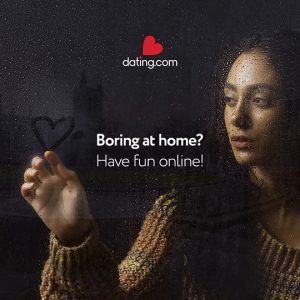
I think about my day online.
A colleague from the other side of the Ocean, Sarah T. Roberts just tweeted this:
Got on Zoom at 8:40 am. Finished on Zoom at 7:30 pm. Didn’t get a shower until 8 pm. Didn’t get dinner till after 9. See ya tomorrow.
I retweet and comment: ‘so fucking true’. Not academically correct, yet so fucking true.
Online is a nightmare. Online is you, the screen, and then you and the screen again. And your friends and colleagues imprisoned in little small cells inside it, as if they were kids’ puppets popping out of the puppet theatre.
You teach about tech dystopias, apply ideology critique to digital media, criticize platform capitalism, show your students how to protect their privacy and avoid surveillance, you do all that while being online.
And then, in the middle of this schizophrenia of yours, you see the Boring at home? Have fun online ads popping up on your Facebook page, suggesting that you use to use the latest dating app, which is of course ‘social-distancing’ friendly.
Dating at the time of Covid-19 is dating the same goddam screen you use for working, calling your family and having a Spritz with friends while watching a film together.
Sydney has given it a try.
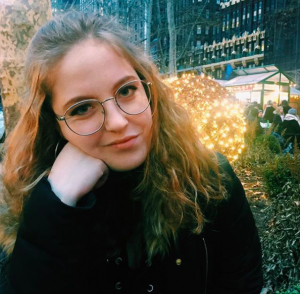
She writes: “Hinges ‘at home’ feature is something I have used. During quarantine, I have matched with and now spend a good amount of time talking to someone I met on Hinge. We have played Minecraft together, discussed shows and our lives, and it’s probably the furthest I have gotten in terms of online dating despite me being present on it for multiple years. I actually consider the connection more powerful than others – and I have even met up with a few men that I have matched with. Perhaps this is because my body is ‘detached’ and ‘annulled’, as Eva Illouz puts it, but I think it’s because I suddenly have time to sit down and really get to know someone before the possibility of being able to meet up is presented to us.”
While Natalia sits in awe, reading Paul B Preciado’s The Losers Conspiracy, she presents the class two quotes from the piece to reflect upon:
“But if things could no longer change, if those who were far apart could never touch each other again, what was the significance of being ridiculous in this way? What was the significance of now telling the person you love that you loved them, all while knowing that in all likelihood she had already forgotten you or replaced you, if you would never be able to see her again in any case? The new state of things, in its sculptural immobility, conferred a new degree of what the fuck, even in its own ridiculousness.”
“Everything will forever retain the new shape that things had taken. From now on, we would have access to ever more excessive forms of digital consumption, but our bodies, our physical organisms, would be deprived of all contact and of all vitality. The mutation would manifest as a crystallization of organic life, as digitization of work and consumption and as dematerialization of desire.”
“But I still don’t believe it. I just can’t believe it,” she adds.
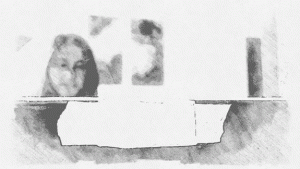
(black mirror in black&white color scheme -Natalia, April 2020)
“8:35 p.m. Your spirit comes through the window and darkens the room. I turn on all the lights. Put a blank cassette in the video camera and screw the camera to the tripod. I check the framing. The image is smooth and symmetrical; the black leather couch forms a horizontal line at the bot- tom of the frame. The white wall easily follows that line, but without creating any feeling of volume or relief. Play. I move to the sofa. Off camera, on the coffee table, I’ve left electric clippers, a small mirror, a sheet of white paper, a plastic bag, a bottle of hypoallergenic glue for use on the face, a dose of fifty milligrams of testosterone in gel form, a tube of lubricant, anal-dilator gel, a harness with a realistic rubber dildo (91⁄2 x 11⁄2 in.), a realistic black silicone dildo (93⁄4 x 21⁄2 in.), a black ergonomic one (51⁄2 x 3⁄4 in.), a razor and shaving cream, a plastic basin filled with water, a white towel, and one of your books, the first, the sublime one, the beginning and end of everything. I walk into the frame. Get undressed, but not completely. Keep my black tank top on (…)
I slide the dildos into the openings at the lower part of my body. First, the realistic-looking one, then the ergonomic one, which goes into my anus. It’s always easier for me to put something into my anus, which is a multidimensional space without any bony edges. This time, it’s the same. On my knees, I turn my back to the camera, the tips of my feet and my head pressing against the floor, and hold my arms behind me so that they can manage the two dildos in my orifices. You’re the only one who could read this book. In front of this camera, ‘for the first time I’m tempted to make a self-portrait for you.’ Design an image of myself as if I were you.”
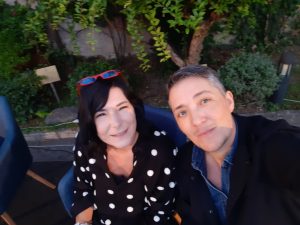
(Donatella Della Ratta and Paul B Preciado @John Cabot University, Oct. 2019)
In Testo Junkie Preciado writes these words for his friend and HIV-positive writer Guillaume Dustan. Dustan and the AIDS crisis in the Europe of the 80s-90s, queer identities and HIV, politics and sex, the politics of sex.
Are we back to square one, are we putting our bodies on trial again? Saliva, sneeze, spit, tears. Off limits. There is no condom that can protect us from these liquids, no condom can save us from the infections contaminating our souls.
How will love look like in the absence of tears, in abstinence from salivation?
A season of drought.
….
Preciado is the only one who can write about having sex with a screen and make it arousing.
Meanwhile, Jackie receives the visit of transhuman love. Oh wow.
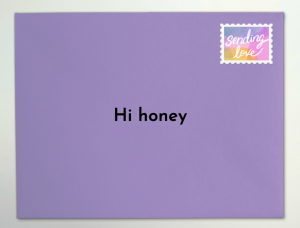
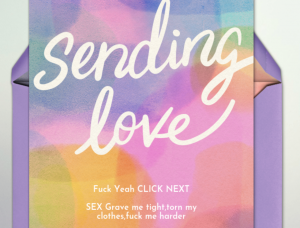
She writes:‘not to brag but i just got an evite from a sex bot. These algorithms sure are getting creative with all this time on their hands’.
ME, MYSELF AND (MY BETTER) I
Questions resonating in the ‘class’ after reading Illouz’s analysis of dating sites. Who is the ‘better’ I? My online self? My physical self? Are they two distinct ‘things’? And are they just two? Really?!?
Briana connects Illouz with her Instagram experience. ‘In Cold Intimacies Illouz writes that “the self became something to be assembled and manipulated for the sake of impression-making and impression management.” Put into basic terms, on social media we display ourselves as if we were a brand: we need to persuade others to ‘consume’ what we are displaying. Funny enough, for a class of mine I had to analyze my Instagram profile and define what my ‘brand’ was. This was the result:
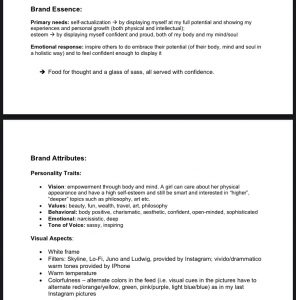
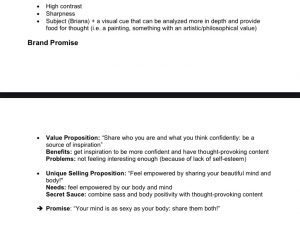
This is from my Instagram account @brianadisisto, if you want to check out if I am actually realistic about my ‘brand’.
Why do we try to display our ‘best’ self online? In my case, it’s not because I believe that my body is a “dead flesh that surrounds the active mind which constitutes the ‘authentic’ self” (Eva Illouz). I love my “in real life” self, I don’t have problems with my physical body, and I’m fine with people seeing me in person even if I, for instance, have a huge pimple on my forehead. But if I have that same pimple in a picture of mine I want to post online, I will 100% edit the pimple out. My online self does not necessarily have to be my “better” self, but it definitely has to be my “perfect” self. Why?
Because my online self – and whoever is that online self – is always object of criticism, because it can be revisited whenever one wants to. It is “eternal”, because what is put online endures in time and can travel through space; the pimple in IRL does not bother me because it is ‘incidental’, it is something that is not always like that, and people know it. An ‘online’ pimple is almost crystallized on your face, it becomes part of how your identity is perceived. So am I ‘lying’ when I edit out my pimple? Am I showing my ideal self or my real self – since I don’t always have pimples? I always respond to myself saying that what I ‘tell’ the online community is nothing more that a white lie.
I am conscious that I am manipulating my online self, and of course I do it to get more attention. But with my bio (which I already spoke about) and my “product description” (an option which is given if you switch to a business profile, and that says a lot about the capitalistic influence behind the platform) which is “art gallery”, I want to make it clear that my online self is fictitious. I put “art gallery” as a product description because nothing in my profile is casual. Like an art gallery, I display my posts based on colors and meaning, and like paintings, my posts require a lot of work: poses, selection between 100+ pictures, editing, filters, lighting’.
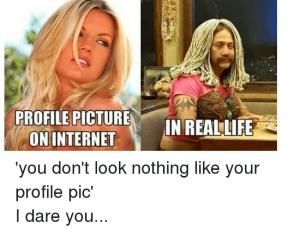
Maybe the online self is just a glossy escape route, a runaway from the vexations of the flesh?
Natalia thinks so. “Are we seeing the online self as a way to escape our bodily anxieties and insecurities? Yes. I think of my very good friend who would almost never talk in class, who would be the embodiment of shyness, yet in online gaming, he would become a perfect leader, unremorseful of being mean to others online or just to troll. Why do we associate the negative with the body? I guess that there are several different reasons. There’s an age issue, fueled by Hollywood commercialization of the ‘young and beautiful’, there’s the difference between acting-in-thoughts and acting-in-body, one often does things differently in physical life than one would imagine body to behave. Body is not always in form, body is what might bother us when we are psychologically well and bright. There’s the long-standing, mostly Western tradition of duality, of body-soul distinction where body is considered as worse, as dirty, as not-desired.
Online, one does not need to worry about body at all.
When I am to post a picture on Instagram, I go through a whole set of re-evaluation and checklist as to what this picture says about the profile, what image of myself am I curating, what this picture adds, does this picture fit to the narrative of myself I go for. We all do it.”

(from Natalia’s blog)
Gabriella does not trust online dating : “How can you be yourself when all you read from the other person is what they are looking for and who they are, sometimes you might feel unconformable and try to fit within the other person standards.”

(Gabriella and her boyfriend -not ‘found’ via apps)
And yet, perhaps it’s not even a matter of escaping or wearing a mask, but of playing with identities and wearing multiple masks: a digital masquerade for the sake of enjoyment, fun, maybe some lightness.
Elena questions the real vs fake binary opposition: “Am I less authentic on the internet? Am I less authentic if I wear make up? What if I gain weight? What if I put a filter on my photo? I think that at the end of the story, I am always Elena. A photoshopped Elena, a dressed up Elena, a digital Elena, a…we don’t have a fixed singular identity but a multi-faceted nature. Pirandello, in his book “Naked Masks” states that ‘self’ and ‘identity’ are concepts which are lost and unachievable in human beings. According to him, everyone wears different masks, each one of them representing our many social roles. This is to say that asking ourselves if we are authentic would, in a sense, limit our nature. We are ALWAYS authentic, it’s not a matter of ‘more’ or ‘less’ authenticity. My emojis are authentic. When I send a laughing emoji when I am angry, I might do it because I don’t want to fight with that person. Does that mean that I am less authentic? No. In fact, lies are authentic. The fact that it’s harder to hide our facial expression in our physical life doesn’t mean anything. I am always authentic, my digital life just gives me the opportunity to lie more easily.”
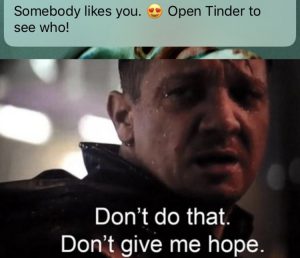
This resonates with Shaina’s words: “We have been brought up to always be conscious of our digital footprint. Don’t post alcohol, don’t post drugs, don’t show too much skin online, if you do, colleges won’t accept you, employers won’t hire you…. These are ideas that have been drilled in our heads from the moment our parents finally let us make a Facebook account in the 7th grade. We have been coached to be cautious of what we share about our lives, so it makes sense that we only advertise the best versions of ourselves online. I do not believe that the digital world is unauthentic, it is respectively authentic. We get to pick and choose what we want to highlight and share with others on the internet, but all content is created somewhere which makes it authentic in some respect. If I photoshop all my pictures, does it make them unauthentic? Is photoshop not authentic? I would say that it is an authentically photoshopped picture.
I have seen many people use the hashtag ‘#instagramvsreality’ which is usually linked to a picture of them looking really good (“instagram worthy”) and then one which is not so flattering, which we as a society have deemed unworthy of posting. Whether I post a picture of me sucking in my gut to look skinny or me letting it all hang out, that is me regardless. No filter, edit, pose, caption, has the power to make me unauthentic, I am who I am, even with a dog filter on my face. Scrolling through Instagram, it would be naive to assume that this is all there is to life. We are all human, we all go through hardships and troubles. We don’t always look perfect, we don’t always have fun…but a picture of me in my pjs, crying, eating chips at 3 am is not likely to gain a lot of positive attention, therefore I decide not to share that part of myself with the internet. It does not mean it doesn’t happen nor that I am unauthentic. I have no pictures of myself crying posted online, but if you ask me if I ever cried, I would of course say yes. The online self is a limited version of an individual. We have the choice to showcase what we want people to see about us, we have the power to sway their opinion of us, but when push comes to shove, we are who we are and there is no hiding that. My online self is part of me.”
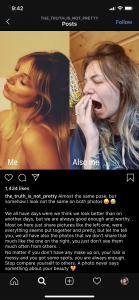
Sophia edits her Tik Tok Quarantine Diaries here reflecting on the process of her selection:



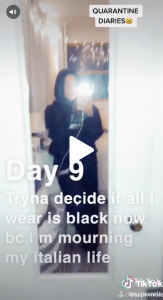
“No part of my quarantine has been particularly interesting, but placing these snaps into a single video has done a few things for me: 1. Shown my ups and downs emotionally during this time 2. really underlined the fact that this could go on for another few months… I can’t help thinking back to the beginning when I thought that I would do my own 14 days and then be free.
I do my best to represent the good and bad sides of myself to the internet. It is not because I feel that I owe anything to the internet, but I like the idea that in the sea of users who are plastic and fake, that there could be an ounce of reality on social media and if that reality is me then I am proud to show it off. — and not on an Instagram which is dedicated to posting the embarrassing aspects of my life, but on my Insta, the ‘real one’. I am the same way on my snapchat, I use it as a form of a diary of my emotions through day to day life I guess you could say.
There is a hashtag #MakeInstagramCasualAgain. This hashtag references the seriousness some people take when it comes to their feed and what they post. Some people take their instagram as serious as their school work and will plan out posts which match just so their feed stays up to their standards. I, on the other hand, whether it annoys my followers or not, will post what I want, when I want. I don’t take myself too seriously online because I don’t do that in the real world.
I am not sure what it says about me that my instagram has always been casual and that I like it that way. Does that make me authentic? or does that make me superficial because I am aiming to be authentic?”
LET’S PUT THE MYTH OF AUTHENTICITY IN QUARANTINE
Worshiping the authentic self is a direct legacy of the Californian ideology. Since the age of the New Age, the Esalen Institute and the Human Potential Movement preaching about unleashing the individual’s full potential, discourses on the (allegedly) inherent authenticity and genuineness of the ‘inner-self’ have been thriving in the Bay area. No wonder that the Internet in which we live is permeated with the myth of authenticity.
Danielle talks about her boyfriend. He asks her: “Why do you care so much about what others think of you?” I guess it’s a disease to care. It’s a disease to be unauthentic. It is addiction and a job to fit a mold. I look at my boyfriend and wonder how he does what he wants and doesn’t feel guilty. He is authentic, and when I first met him I never thought of him as that because when you meet individuals you take all the collective interactions and use them as definitions of what they truly are. But if I study all of the first couple of interactions we had, he may have fell in love with someone who isn’t me at all…rather a projection of who I want to be. But you can only keep up an act for so long, and I wanted to know if I was unauthentic with him. So i did an experiment.
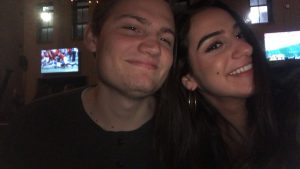
Danielle: “Flashback to the beginning of our relationship and before we started dating. Based on your first impressions and interactions with me how would you describe my personality and character versus how I actually am?”
Nick: “You were less obnoxious. *laughs* No, don’t use that word. You were who you are. You didn’t try to hide that, you were a normal amount of shyness. You may have dimmed things down, but I think the person I met is the same person I am with today. You were going to therapy when we first met, and you were feeling really confident in talking about yourself and expressing your inner thoughts and emotions. I think I may have met you during a really pivotal time in your self growth where you were fed up with saying the conventional so you felt liberated in saying and being authentic.”
I thought to myself “I really thought I was being more conservative and put together than I was putting off”, this experiment didn’t prove my point. But maybe it proved another one. Being authentic in person is unavoidable. There are too many give aways to try to be unauthentic. Your facial expressions, your inability to lie, your tone and attitude, underlying thoughts and opinions, and the inability to craft a thoughtful response because you are on the spot. Therefore it takes less thinking, energy and time to be authentic. Maybe I am just a bad liar, maybe I am not clever enough to be inauthentic in person. But I think that it is much easier to be inauthentic online. Online where you can create any storyline, refer to past texts, and decorate your lengthy paragraphs with emojis, it has never been easier to be someone else.”

(Danielle and her boyfriend Nick-he gave consent)
Truth is, in the end, that “in this quarantine I find myself being the least authentic version of myself. I have this enormous guilt of having to wake up at a certain time, to prove to my friends, family, and myself that I am not being lazy. Because society has taught me that laziness is bad. To exercise and diet, to make sure I don’t gain weight. Because being fat is unhealthy. To get a certain amount of work done a day. To prove that I am being productive.
But is that being authentic… no the truth is I want to sleep till 1pm, order McDonalds and not feel guilty about it. I would be authentic if I did just that…but I never do. Being authentic is hard. In my opinion the online world only makes it easier to fake the hard thing. So, yes, I lie about what time I wake up, how many assignments I finished, and if I worked out or not… not too authentic huh.”
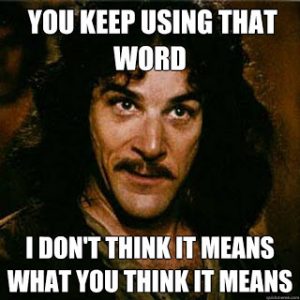
Marta might have found a better, less ideological word to replace authenticity: vulnerability.
‘in my opinion we are not more authentic in the virtual world..I think we are less vulnerable because we hide behind a screen’.
TRANSPARENT BODIES AND YUMMY (ITALIAN?) MEALS
Jackie reflects on Illouz, Melissa Broder’s ‘So Sad Today’, and Italian gourmet food you can find only in the United States.
‘In Melissa Broder’s discussion on her online relationship full of passionate sex(ts) there is a transparency in her affair even before they manage to meet in person, and though they shared more details about their lives, childhoods, and aspirations, this extension of genuine emotion parallel to her own is what allowed Broder to say “You see me. I am finally seen” (Broder, p. 43)*. Without physical bodies to respond to attraction we are instead left to be aroused by truth, and though the internet is a questionable platform for honesty finding such can mean a connection that can withstand technological boundaries.
The initial formation of this internet self, from handles to bios and even the choice of posts, is a strategic form of packaging meant to be sold for romantic entanglement. Similarly, the use of choice on dating sites and even swiping on apps turns a chemical process into a mechanical one similar to pointing at your selection of meats at a butcher. While connections may (evenutally) be real the process to get there is the same as the rebranding for Chef Boyardee, only the board rooms and focus testings go through one group: you.
The internet ultimately rationalizes the spontaneity of love, according to Illouz. While there is truth to this and the evidence that capitalism has completely restructured our lives, I politely disagree. While, yes, every friend I have made on the internet included a months worth of prep before actually talking with them because I had to “set myself up” to seem like a worth while interaction, the genuine connections stood out from the garbage providing me with lasting relationships I have watched evolve over the past decade. And even if choosing a mate on an app is no different than liking the label of Chef Boyardee, nothing beats the taste that reminds you of a diabetic childhood and will clog your arteries forever’.
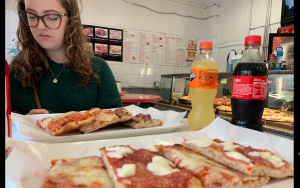
(Jackie’s ‘last supper’ in Rome – featuring Sydney)
PS. Before Jackie wrote this piece I was not aware that Americans trust a chef who cooks “delicious Italian flavours” and yet has a name that does not sound Italian at all (to me). Nomen omen.

(yeah, I know Jackie)
GORGIAS, LEOPARDI AND THE ART OF SEXTING
Briana proudly posts about her sexting:
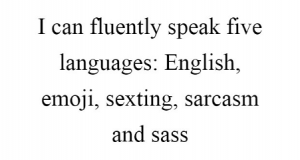 “And I’ve been definitely practicing all of these lately. The first one to avoid complete isolation, the second one to fake emotions, the third one in memory of the good old days, the fourth one while writing this post, the fifth is my mother tongue, no need to practice.
“And I’ve been definitely practicing all of these lately. The first one to avoid complete isolation, the second one to fake emotions, the third one in memory of the good old days, the fourth one while writing this post, the fifth is my mother tongue, no need to practice.

This screenshot is taken from the chat with my ex boyfriend, right after having finished sexting.
Real sexting requires intimacy, desire to make the other feel good from a distance and knowledge on how to pursue this. I can state with extreme certainty that I have never sexted with someone I haven’t slept with before. In order to be “effective” in sexting, you have to create a context and act in it (this is why I find it helpful to relate to previous IRL experiences); you have to make the other sense your tone of voice, your look, your smell, your touching them… all through words. Essentially, you have to condense all five senses in one: sight. And not necessarily sight of your naked body through nudes, but sight of pixels that compose words on a screen. When I am able to engage in good sexting, and when I tell that I am making someone excited just by using my words, I feel extremely empowered, and almost proud of myself: being able to sext well means I am a careful observer of what people like and desire, and that I am able to create images, fantasies in others’ minds using merely my words. And let me tell you, these fantasies don’t always mirror ‘reality’, or at least my physical self in that precise moment. Actually, they hardly ever do.
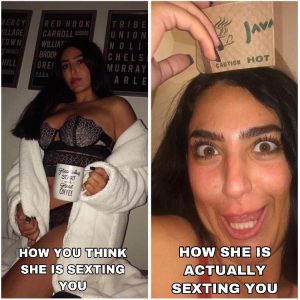
This is what I mean. I created this meme with my best friend, Elena Santoro @iamyourhappyaccident. We are very intimate and we will, without any problem, share our sexts and talk about them openly. We always joke about how guys might have expectations of us laying in bed, in a very sexy outfit or naked, in a submissive position… all because of how good we are in creating this fantasy in their heads. Instead, we are literally looking like sh*t.
Citing Gorgias, ‘A single speech charms and convinces a crowd when skillfully composed, rather than when truthfully spoken (Helen 13). To make it more relatable, I will change it into ‘A single sext charms and convinces the receiver when skillfully composed, rather than when truthfully spoken’.”
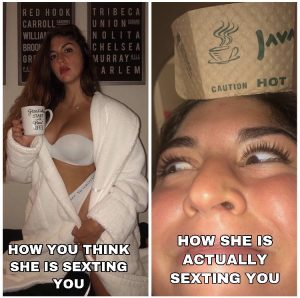
Elena quotes the Italian writer Leopardi, responding to her best friend’s quoting from the Greek philosopher Gorgias:
“I am a Leopardian person: for me, ‘to await a pleasure, is itself a pleasure’. Sexting is more exciting than a sexual encounter because it contains the magic of the ‘not yet’. The ‘not yet’ for me is more exciting than the ‘already’….once you had sex…well, you had sex and that’s it. What about the overwhelming feeling of desire before the sexual encounter? The adrenaline, the energy, the excitement…those feelings are more vivid before the very act. The act itself is no doubt beautiful but less beautiful than before. Just like a Sunday morning is less beautiful than a Friday night. There is beauty in the journey. There is beauty in the digital. Also, when I sext with someone, I don’t think about my stretch marks, or my small chest. I am the disembodied version of me. I am as invisible as perfect. My sexiness is determined by my ability to write, my brain becomes the new vagina.”
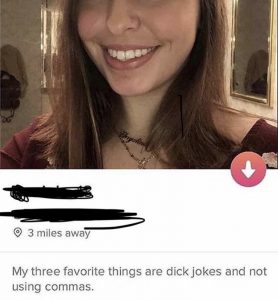
TO MATCH OR NOT TO MATCH, THAT IS THE QUESTION
We end with Sydney who is telling a story about ordinary algorithmic madness from her neighborhood.
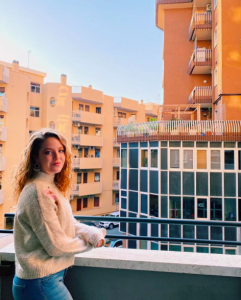
“We are placed under a heavy pressure of self-observation, self-labeling, and abstraction in order to achieve the statistics of who is the most compatible with us. It made me think of my neighbor, Lynn Freda. Lynn is one of the sweetest women out there, constantly baking us cookies. She’s like a neighbor in a sitcom. Before she became our neighbor, though, she went through a nasty divorce. My family and other neighbors basically pressured her into trying match.com. She had to fill out the extensive questionnaire. We were waiting with baited breath to see who Lynn would get. We so desperately wanted her to find love. And she was actually excited! finally, she got her number one potential match: her ex-husband.”

